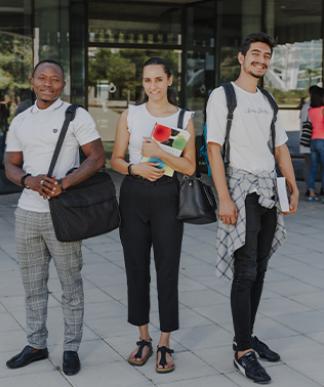


About the Program
This program aims to train individuals who can develop artificial intelligence techniques and tools, are capable of analyzing and producing solutions for problems that are required for data collection and interpretation. It is also aimed to train students with the ability to select, use and evaluate the analysis and development stages of software systems, using current technologies in the information sector and equip students with skills in software analysis and development.
In this regard, it is aimed to enable Artificial Intelligence Engineering students to analyze data, be able to detect related problems and find appropriate solutions and implement theseis solutions by using the possibilities offered by artificial intelligence technologies. It aims to enable students by gaining knowledge, by working on the effective use of artificial intelligence engineering.
It is also aimed to train engineers who can always renew themselves and contribute to the field of artificial intelligence engineering and have developed a research culture about the rapidly developing software systems.
Education Opportunities
The Artificial Intelligence Engineering Program was established to enable students to gain interdisciplinary competence through a curriculum enriched by computer engineering, information systems engineering, and software engineering program courses.
By attending an internship during the last year of the Artificial Intelligence Engineering Program, students will be able to start their career life one step ahead with the practical experience they will gain. To reinforce the theoretical knowledge they have obtained, students are provided with a wide range of laboratories at CIU, which allow them to experience software or hardware development processes, involving artificial intelligence.

Career Areas
Students who will graduate from the Artificial Intelligence Engineering Program, will take the title of an “Artificial Intelligence Engineer” and will be able to be employed at all areas in the software and robotics sector.
Intelligence methods are needed in computer software and robotics practices used in many industries today. Students will be competent enough to do sectoral software development work mainly in engineering, banking and finance, education, medicine, and public areas. They will also be able to continue their academic careers by doing a Master's or a Doctorate Degree.
Contact
Faculty of Engineering
Science and Technology Center, ST 226
Tel: +90 392 671 1111 Extension: 2401
Faculty E-mail: secretary-fe@ciu.edu.tr
Head of Department: Asst. Prof. Dr. Devrim SERAL
Head of Department E-mail: dseral@ciu.edu.tr
Compulsory Courses
First Semester
INTRODUCTION TO ARTIFICIAL INTELIGENCE ENGINEERING
Course code
AIEN100Credit
0Theoretical
1Practical
0Ects
4INTRODUCTION TO COMPUTING
Course code
CMPE101Credit
3Theoretical
2Practical
2Ects
5READING AND WRITING SKILLS-I
Course code
ENGL141Credit
3Theoretical
2Practical
2Ects
4CALCULUS-I
Course code
MATH101Credit
4Theoretical
3Practical
2Ects
6LINEAR ALGEBRA
Course code
MATH121Credit
2Theoretical
2Practical
0Ects
4GENERAL PHYSICS-I
Course code
PHYS101Credit
4Theoretical
3Practical
2Ects
6TURKISH LANGUAGE
Course code
TREG100Credit
0Theoretical
2Practical
0Ects
2TURKISH
Course code
TURK100Credit
0Theoretical
2Practical
0Ects
2Second Semester
INTRODUCTION TO PROGRAMMING
Course code
CMPE112Credit
4Theoretical
3Practical
2Ects
6READING AND WRITING SKILLS-II
Course code
ENGL142Credit
3Theoretical
2Practical
2Ects
4HISTORY OF CIVILIZATION
Course code
HIST100Credit
0Theoretical
2Practical
0Ects
2CALCULUS-II
Course code
MATH102Credit
4Theoretical
3Practical
2Ects
6DISCRETE MATHEMATICS
Course code
MATH122Credit
3Theoretical
3Practical
1Ects
5GENERAL PHYSICS-II
Course code
PHYS102Credit
4Theoretical
3Practical
2Ects
6MODERN TURKISH HISTORY
Course code
TARH100Credit
0Theoretical
2Practical
0Ects
2Third Semester
PRINCIPLES OF ARTIFICIAL INTELLIGENCE
Course code
AIEN201Credit
3Theoretical
3Practical
0Ects
7DIGITAL LOGIC DESIGN
Course code
CMPE221Credit
4Theoretical
3Practical
2Ects
5ALGORITHMS AND PROGRAMMING
Course code
CMPE223Credit
4Theoretical
3Practical
2Ects
6DIFFERENTIAL EQUATIONS
Course code
MATH203Credit
3Theoretical
3Practical
1Ects
6INTRODUCTION TO PROBABILITY AND STATISTICS
Course code
MATH205Credit
4Theoretical
4Practical
1Ects
6Fourth Semester
INTRODUCTION TO DATA SCIENCE
Course code
AIEN202Credit
4Theoretical
3Practical
2Ects
7VISUAL PROGRAMMING
Course code
CMPE214Credit
3Theoretical
3Practical
1Ects
6DATA STRUCTURES AND DATA ORGANIZATION
Course code
CMPE242Credit
4Theoretical
3Practical
2Ects
7ENGINEERING ECONOMY
Course code
INDE232Credit
3Theoretical
3Practical
0Ects
4MATHEMATICAL METHODS FOR ENGINEERS
Course code
MATH202Credit
4Theoretical
3Practical
2Ects
6Fifth Semester
PROGRAMMING FOR ARTIFICIAL INTELLIGENCE
Course code
AIEN301Credit
3Theoretical
3Practical
1Ects
5OBJECT ORIENTED PROGRAMMING
Course code
CMPE313Credit
4Theoretical
3Practical
2Ects
7DATABASE MANAGEMENT SYSTEMS AND PROGRAMMING-I
Course code
CMPE343Credit
4Theoretical
3Practical
2Ects
6OPERATING SYSTEMS
Course code
CMPE351Credit
4Theoretical
3Practical
2Ects
6SIGNALS & SYSTEMS
Course code
EELE321Credit
4Theoretical
4Practical
1Ects
7Sixth Semester
MACHINE LEARNING
Course code
AIEN302Credit
4Theoretical
3Practical
2Ects
6NEUROBIOLOGY
Course code
AIEN304Credit
3Theoretical
3Practical
0Ects
6SIGNAL AND IMAGE PROCESSING
Course code
CMPE326Credit
3Theoretical
3Practical
1Ects
6FUNDAMENTALS OF COMPUTER NETWORKS
Course code
CMPE332Credit
4Theoretical
3Practical
2Ects
7UNIVERSITY ELECTIVE
Course code
UNIEXX1Credit
3Theoretical
3Practical
0Ects
4Seventh Semester
SUMMER TRAINING
Course code
AIEN300Credit
0Theoretical
0Practical
0Ects
5FUNDAMENTALS OF NEURAL NETWORKS
Course code
AIEN421Credit
3Theoretical
3Practical
0Ects
5AREA ELECTIVE
Course code
AIENXX2Credit
3Theoretical
3Practical
0Ects
6AREA ELECTIVE
Course code
AIENXX3Credit
3Theoretical
3Practical
0Ects
6ROBOTICS
Course code
EELE411Credit
3Theoretical
3Practical
1Ects
5PROJECT MANAGEMENT
Course code
ENGI401Credit
3Theoretical
3Practical
0Ects
4Eighth Semester
NATURAL LANGUAGE PROCESSING
Course code
AIEN422Credit
4Theoretical
3Practical
2Ects
6AREA ELECTIVE
Course code
AIENXX4Credit
3Theoretical
3Practical
0Ects
6AREA ELECTIVE
Course code
AIENXX5Credit
3Theoretical
3Practical
0Ects
5CAPSTONE PROJECT
Course code
ENGI402Credit
4Theoretical
2Practical
4Ects
8UNIVERSITY ELECTIVE
Course code
UNIEXX2Credit
3Theoretical
3Practical
0Ects
4Elective Courses
COMPUTER SIMULATION
Course code
CMPE485Credit
3Theoretical
3Practical
0Ects
PROGRAMMING IN MATLAB FOR ENGINEERING
Course code
ENGI316Credit
3Theoretical
3Practical
0Ects
EMBEDDED SYSTEMS
Course code
CMPE455Credit
3Theoretical
3Practical
0Ects
5MOBILE APPLICATION DEVELOPMENT
Course code
CMPE425Credit
3Theoretical
3Practical
0Ects
IOT FOR ENGINEERING
Course code
ENGI416Credit
3Theoretical
2Practical
2Ects
5TRNC citizens and TR citizen candidate students who have completed their entire high school education in TRNC. They are placed in undergraduate programs in line with their success in the CIU Student Placement and Scholarship Ranking Exam and the programs they prefer.
Students who are successful in the exam can register from the TRNC Marketing Office.
Applicants can directly apply online to our undergraduate programs by using the application portal. Please fill in your details correctly and upload all the required documents listed on the last page of the application form.
Required documents;
- Completed application form,
- Higher/Secondary Certificate or equivalents (e.g. O/A’Level, WAEC/NECO)
- Evidence of English Language competence: TOEFL (65 IBT) or IELTS (5.5). Students without these documents will take the CIU English proficiency exam on campus following arrival,
- Scanned copy of international passport/birth certificate,
- Fully completed and signed CIU Rules and Regulations document (which can be downloaded during the online application).
Cyprus International University provides academic scholarships for its students as an incentive for success, with most students benefiting from 50%, 75% or 100% scholarships or discounted tuition fees. Click for more information.
Tuition Fees are determined at the beginning of each academic year. Candidate students who are entitled to enroll in CIU can learn their fees in line with the Tuition Fee Calculation system.